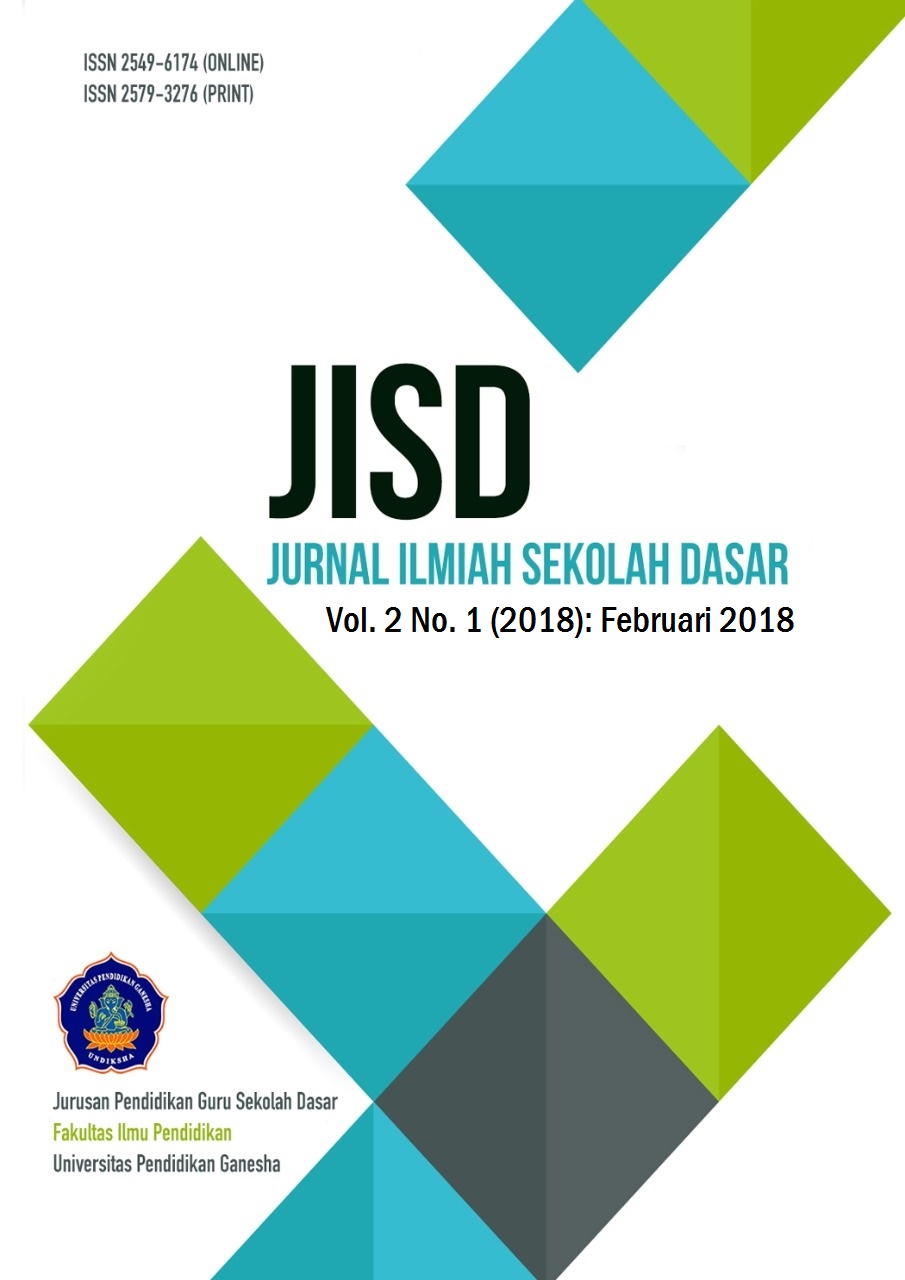Pengaruh Model Discovery Learning Berbantuan Media Audio Visual dalam Setting Lesson Study Terhadap Hasil Belajar IPA Mahasiswa PGSD Undiksha UPP Denpasar Tahun 2017
DOI:
https://doi.org/10.23887/jisd.v2i1.13895Abstrak
This research is intended to know the influence of NHT model by audio visual media toward the mastery of science competence of fourth grade students of SD Gugus Yos Sudarso in academic year 2016/2017. Type of research conducted in this research is quantitative research with experimental design that is quasi experiment (Experimental Semu). The experimental design used is "Nonequivalent control group design". In the two samples that have been drawn are one group of expreiments and one control group. Class IVB SDN 12 Sanur as experimental group and grade IVC SDN 10 Sanur as control group. The learning in the experimental and control class is equally given 6 times, and is given the last postet to know the improvement of the knowledge competence of science knowledge. To collect data in this research is done by test method. The data obtained were analyzed using the t-test. The results of data analysis obtained thitnung = 6,536 while at the level of significance 5% and dk = 68 obtained t table = 2,000 so thitung = 6,536 > t table = 2,000. Based on the test criteria, Ho is rejected and Ha accepted. The average value of science knowledge competence in the group that was taught with NHT model with audio visual aid was 80.17, while in the group taught by conventional learning was 68,66. So it can be concluded that Model Type NHT Assisted Audio Visual Media influence on the mastery of knowledge competence of science class IV elementary school Gugus Yos Sudarso District South Denpasar Lesson 2016/2017.Referensi
Arsyad, Azhar. 2013. Media Pembelajaran. Jakarta: PT RajaGrafindo Persada.
Bintari, Ni Luh Gede Riwan Putri. 2014. “Pembelajaran Bahasa Indonesia Berdasarkan Pendekatan Saintifik (Problem Based Learning) Sesuai Kurikulum 2013 Di Kelas Vii Smp Negeri 2 Amlapura”. Jurnal Pendidikan dan Pengajaran. Volume 3, Edisi Juni, (hlm.1--10)
Hosnan. 2014. Pendekatan Saintifik Dan Kontekstual Dalam Pembelajaran Abad 21. Bogor: Ghalia Indonesia.
Kurniasih, Imas & Sani, Berlin. 2016. Ragam Pengembangan Model Pembelajaran Untuk Peningkatan Profesionalitas Guru. Yogyakarta: Kata Pena.
Kosasih. 2014. Strategi Belpelajaran dan Pembelajaran Implementasi Kurikulum 2013. Bandung: YRAMA WIDYA.
Marjan, Johari. 2014. “Pengaruh Pembelajaran Pendekatan Saintifik Terhadap Hasil Belajar Biologi Dan Keterampilan Proses Sains Siswa Ma Mu’allimat Nw Pancor Selong Kabupaten Lombok Timur Nusa Tenggara Barat”. Jurnal Pendidikan dan Pengajaran. Volume 4, Edisi Mei, (hlm.1—12)
Sanjaya, Wina. 2010. Strategi Pembelajaran Berorientasi Standar Proses Pendidikan. Jakarta: Prenada Media Group.
Setyosari, Punaji. 2015. Metode Penelitian Pendidikan & Pengembangan. Jakarta: PT Kharisma Putra Utama.
Susanto, Ahmad. 2013. Teori Belajar & Pembelajaran di Sekolah Dasar. Jakarta: PRENAMEDIA GROUP.
Trianto. 2011. Pengantar Penelitian Pendidikan Bagi Pengembangan Propesi Pendidikan & Tenaga Kependidikan. Jakarta: Prenada Media Group.
Wartini, Ida Ayu Km Mirah. 2014. “Pengaruh Implementasi Pendekatan Saintifik Terhadap Sikap Sosial Dan Hasil Belajar Pkn Di Kelas Vi Sd Jembatan Budaya, Kuta”.Jurnal Pendidikan dan Pengajaran. Volume 4, Edisi Juni, (hal.1—11)
Unduhan
Diterbitkan
Cara Mengutip
Terbitan
Bagian
Lisensi
Authors who publish with the Journal Ilmiah Sekolah Dasar agree to the following terms:
- Authors retain copyright and grant the journal the right of first publication with the work simultaneously licensed under a Creative Commons Attribution License (CC BY-SA 4.0) that allows others to share the work with an acknowledgment of the work's authorship and initial publication in this journal.
- Authors are able to enter into separate, additional contractual arrangements for the non-exclusive distribution of the journal's published version of the work (e.g., post it to an institutional repository or publish it in a book), with an acknowledgment of its initial publication in this journal.
- Authors are permitted and encouraged to post their work online (e.g., in institutional repositories or on their website) prior to and during the submission process, as it can lead to productive exchanges, as well as earlier and greater citation of published work. (See The Effect of Open Access)











